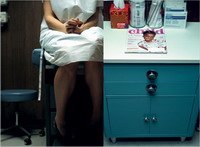Hospital personnel to give emergency contraception to all rape victims
Roman Catholic bishops will let hospital personnel give emergency contraception to all rape victims, reversing their decision days before a new state law requires it.

The church, which runs four of the state's 30 hospitals, had fought the state law requiring medical personnel to give rape victims emergency contraception, sold as Plan B, even if the women are ovulating.
Church officials had said the treatment was tantamount to abortion and had been considering legal action, but they took a step away from that position Thursday, in a joint statement by the Catholic Bishops of Connecticut and leaders of the Catholic hospitals.
The hospitals will be allowed to provide Plan B without ovulation tests "since the teaching authority of the church has not definitively resolved this matter and since there is serious doubt about how Plan B pills work," the statement reads. "To administer Plan B without an ovulation test is not an intrinsically evil act."
Plan B is a high dose of a drug found in many regular birth-control pills. Its maker, Barr Pharmaceuticals Inc., got approval last year to sell the drug over-the-counter.
The company says Plan B can lower the risk of pregnancy by up to 89 percent if taken within 72 hours of unprotected sex. The drug works by stopping ovulation and has no effect on an existing pregnancy.
The new law requires a pregnancy test, but not an ovulation test, before the drug is given. The Catholic hospitals wanted to first perform ovulation tests, and church officials said Thursday the law still should be changed to allow that.
Roman Catholics believe that life begins at conception, and the fact that Plan B is intended to work after sexual activity but prior to conception complicated their response.
Barry Feldman, a spokesman for the Connecticut Catholic Conference, said the bishops had "an evolution of thinking" about "the state of existing science and the lack of definitive teaching by the church and the fact that there are many who are affiliated with the church that believe the ovulation test isn't necessary."
The bishops consulted with Catholic ethicists and various constitutional lawyers. Some lawyers agreed the state law is unconstitutional, but warned that such a lawsuit could drag on for years, Feldman said.
"If they could find a way morally to do so, they wanted to put the issue to rest, at last, for the moment," he said, adding that the bishops might reconsider if there's more "certainty in the science" about Plan B.
Several states have enacted laws to improve rape survivors' access to the medication in hospital emergency rooms; some states also have laws that protect pharmacy employees who refuse to sell the contraceptive for reasons of conscience.
Connecticut's law takes effect Monday. According to Connecticut Sexual Assault Crisis Services Inc., 40 percent of rape victims were not offered or did not receive the full dose of emergency contraception at the hospitals where they were treated during the first half of 2006.
"It's a welcome change," said Laura Cordes, policy and advocacy director for the assault crisis service. "It's welcome news for women in Connecticut who survive rape and turn to hospitals for treatment and evidence collection."
Subscribe to Pravda.Ru Telegram channel, Facebook, RSS!


